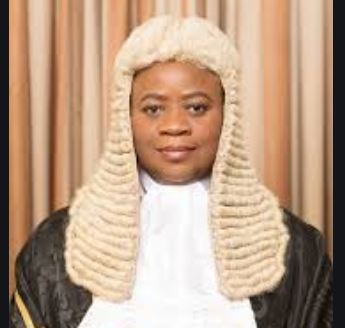Court of Appeal’s N50,000 filing deposit stirs controversy
Lawyers have disagreed with the Court of Appeal’s introduction of a new filing deposit of N50,000 under the Court of Appeal Order 8, Rules 11 and 12 of November 1, 2021. ‘New deposit rule could impede access to justice’ A Kebbi-based lawyer, Umar Aminu Kalgo, in a petition to the Chief Justice of Nigeria (CJN), […]

Justice Monica Dongban-Mensem, PCA
Lawyers have disagreed with the Court of Appeal’s introduction of a new filing deposit of N50,000 under the Court of Appeal Order 8, Rules 11 and 12 of November 1, 2021.
‘New deposit rule could impede access to justice’
A Kebbi-based lawyer, Umar Aminu Kalgo, in a petition to the Chief Justice of Nigeria (CJN), Justice Ibrahim Tanko Muhammad, and other legal stakeholders over the new deposit for appeal at the Court of Appeal, said it had added a new bureaucratic impediment to access to justice and hike in the cost of litigation.
Barr Kalgo said he was aware of the safety net provided indigent litigants, but that the “safety net is ineffective in functionality and will only achieve the contrary by barring indigent persons from access to the Court of Appeal.”
“Firstly, the minimum sum of N50,000 deposit is anticipatory, based on speculation of any cost which the court may award against the appellant in the course of litigation.
“Simply, it is a demand for a probable obligation, which may or may not arise at all. Even where it arises at the end of the day, the appellant must still have been subjected to performance of obligation before it is legally due.”
While calling on the President of the Court of Appeal, Justice Monica Dongban-Mensem, to issue a practice direction suspending Order 8, Rules 11 and 12, Kalgo asked the Attorney General of the Federation (AGF) and Minister of Justice, Abubakar Malami (SAN), President of the Nigerian Bar Association (NBA), Olumide A. Akpata, and the National Assembly to cause a public hearing on the issue through its oversight powers.
Similarly, human rights activist, Barr Abubakar Sanni, said the new filing fee was excessive, and questioned the basis for the increment.
According to Barr Sanni, Section 248 of the Nigerian Constitution of 1999 which empowers the President of the Court of Appeal to make Rules of Practice and Procedure is silent on the issue of filing fees.
He said, “Even if those fees are construed as concomitant to the rules which prescribe filing of processes, they should be within relatable parametres.
“What is the basis upon which the fees were arrived at in the first place, let alone being renewed?
“Beyond that, the larger and more fundamental question is whether that power even exists. I doubt it. If it is purportedly conferred by the National Assembly under the Court of Appeal Act, it might be ultra vires, because nothing in the constitution empowers the National Assembly to do that.”
Reacting to the deposit fee, Barr Hameed Ajibola Jimoh said, “The N50,000 deposit will deny access to court to prospective appellants, especially the indigent and some of us human rights activists that use our money to help indigents in deserving cases.
“The said provision is already causing denial, and I had to think twice before resolving to file an appeal to help indigents since the rules came into force last year November. The said provision mandating such fee is very unfortunate, to say the least.
“I hope the President of the Court of Appeal reverses this decision with a practice directive as soon as possible to ensure access to the court by all; even at the appellate court.”
Barr E.M.D. Umukoro on his part said although the idea behind the N50,000 filing deposit might appear laudable, it could locked out the poor from accessing justice.
Barr Umokoro said, “Within the law, the court has inherent powers to make orders for judgment debt or monies to be deposited in an interest-yielding account. Therefore, the question is why this new directive?
“It is important before policies of this nature are introduced the litigants and their counsels (via the NBA) are given opportunities to make contributions or make recommendations; that way the public is carried along.”
‘Fee will increase the revenue of the court’
On his part, a former Attorney General of Ekiti State, Dayo Akinlaja (SAN), said the government wanted to increase the revenue-generating capacity of the courts, which to him, is like a double-edged sword.
He explained that, “A respite is that for litigants who are truly indigent and incapable of paying, there is a window of opportunity for them to avoid the payment.
“All the same, the balance must be well maintained to ensure that people are not unduly priced out of the temple of justice.”
Also, Dr Garba Tetengi (SAN) said he did not consider the new filing fee excessive because of the rate of inflation in the country.
Dr Tetengi said, “I sincerely believe that it is not high considering the rate of inflation in Nigeria. “Although the judicial arm of government is tailored to allow accessibility to all, yet the current realities of life in Nigeria and the near neglect of the judicial arm by the other two democratic partners have vindicated this conduct.
“Let the executive and legislative arms of government be patriotic to the judicial arm and see it as a partner in progress.”
A former NBA Chairman of Ikorodu branch, Bayo Akinlade, also said he did not oppose the increase in the filing fee because it was a means of decongesting the court.
Barr Akinlade said, “We have backlogs and congestions in our courts because litigation is too cheap.”
